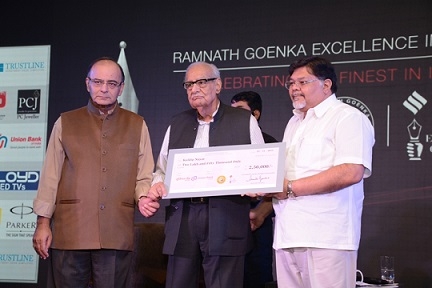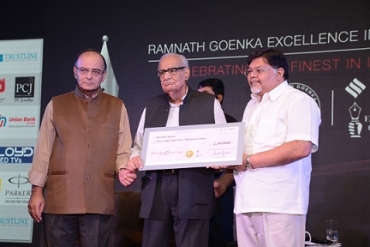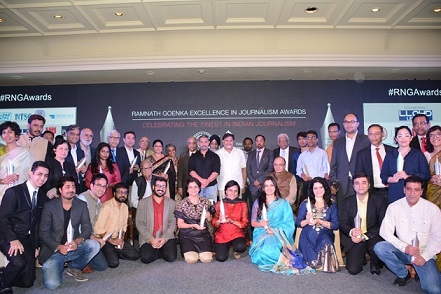
 From moving accounts of the 2012 Muzaffarnagar riot survivors to a series of reports from Syria and Iraq on the havoc wrought by the Islamic State; from sterilization deaths in Chhattisgarh to heart-warming accounts of young girls learning to play cricket in a Maoist-affected village in Jharkhand, the eight edition of the Ramnath Goenka Excellence in Journalism Awards for 2013 and 2014 was a celebration of how stories should be told – simply,factually.
From moving accounts of the 2012 Muzaffarnagar riot survivors to a series of reports from Syria and Iraq on the havoc wrought by the Islamic State; from sterilization deaths in Chhattisgarh to heart-warming accounts of young girls learning to play cricket in a Maoist-affected village in Jharkhand, the eight edition of the Ramnath Goenka Excellence in Journalism Awards for 2013 and 2014 was a celebration of how stories should be told – simply,factually.
Union Minister for Finance, Corporate Affairs and Information and Broadcasting Arun Jaitley, who was the chief guest at the function, gave away awards to 56 journalists who went the extra mile for their stories.
Veteran journalist, columnist and author Kuldeep Nayar was honoured with the Lifetime Achievement Award for his far-reaching contribution to the field of journalism in a career spanning over five decades. As Editor at The Indian Express, Nayar symbolised journalism’s fight against Emergency and was jailed under the Maintenance of Internal Security Act for leading a protest against the excesses of the administration.
Radheshyam Bapu Jadhav of The Times of India won the Prakash Kardaley Memorial Award for Civic Journalism (2014) for his reports on illegal buildings in Pune and the fear of the residents and Madhvi Tata of the Outlook won the award for environmental reporting for 2014 for her story on how the new Andhra Pradesh capital will destroy farming in Guntur, the state’s most fertile region.
Shamni Pande of India Today won the award in the Business and Economic Journalism category for her story on the skilling crisis in the country and how the gap refuses to close.
 The Indian Express reporters Dipankar Ghose and VN Apurva bagged the award for On-The-Spot reporting in 2013 for documenting the Muzaffarnagar communal violence. In the ‘Reporting from J&K and the Northeast’ category, Esha Roy of the Indian Express won the award for her story on the gang rape of a girl in a remote Meghalaya town (2013) and for her 2014 story on Iron Sharmila that captured the life the activist lost and the memories that sustained her.
The Indian Express reporters Dipankar Ghose and VN Apurva bagged the award for On-The-Spot reporting in 2013 for documenting the Muzaffarnagar communal violence. In the ‘Reporting from J&K and the Northeast’ category, Esha Roy of the Indian Express won the award for her story on the gang rape of a girl in a remote Meghalaya town (2013) and for her 2014 story on Iron Sharmila that captured the life the activist lost and the memories that sustained her.
This year’s awards introduced two new categories – Photo Journalism and Feature Writing. Tashi Tobgyal of The Indian Express won the Photo Journalism award for 2013 for his breathtaking image of fog-enveloped mountains as he undertook a three-day trek to Kedarnath temple after the Uttarakhand cloud burst.
In the Broadcast section, Uma Sudhir of NDTV 24X7 won the award in the Uncovering India Invisible category (2014) and Deepa Balkrishnan of CNN IBN won the award for Reporting on Politics and Government (2013) for her documentary exposing the link between mining and politics in Karnataka.
The function was followed by an engaging conversation with Aamir Khan, actor, producer, director, and one of the most influential public figures in India today.
Earlier, welcoming the guests, Viveck Goenka, chairman of the Express Group and the Ramnath Goenka Foundation, said that the record number of applicants this time, 700, and the quality of stories awarded shows that excellence in journalism isn’t in short supply. “You only need to look beyond your smartphone and the remote control,” he said.
Journalists, like economists, he said, have to be students of “human nature, of exuberance and fear”, especially at a time of disruptive change.And listening and learning lie at the heart of good journalism.